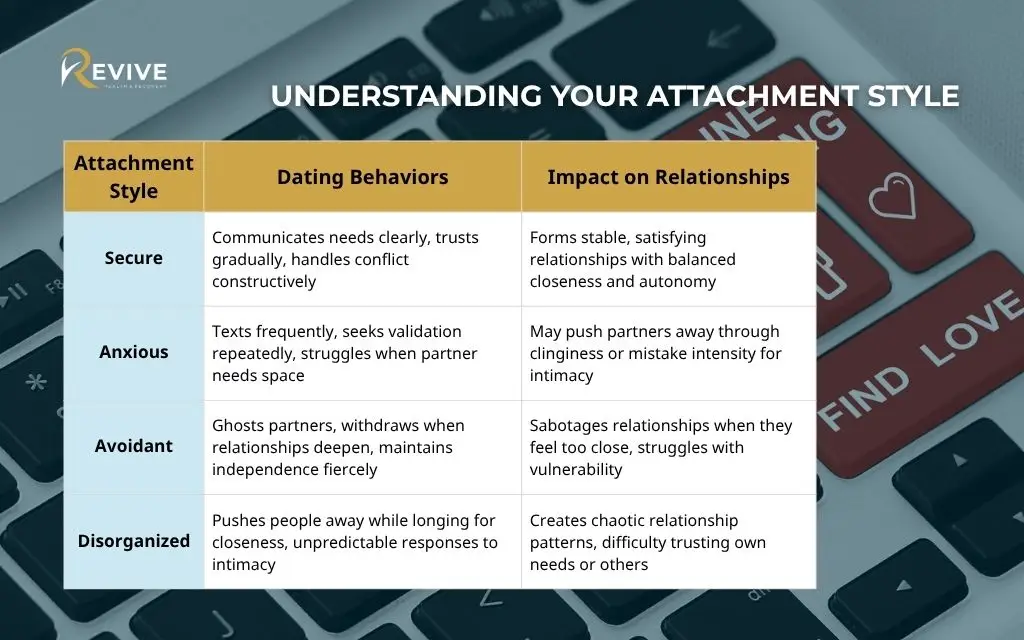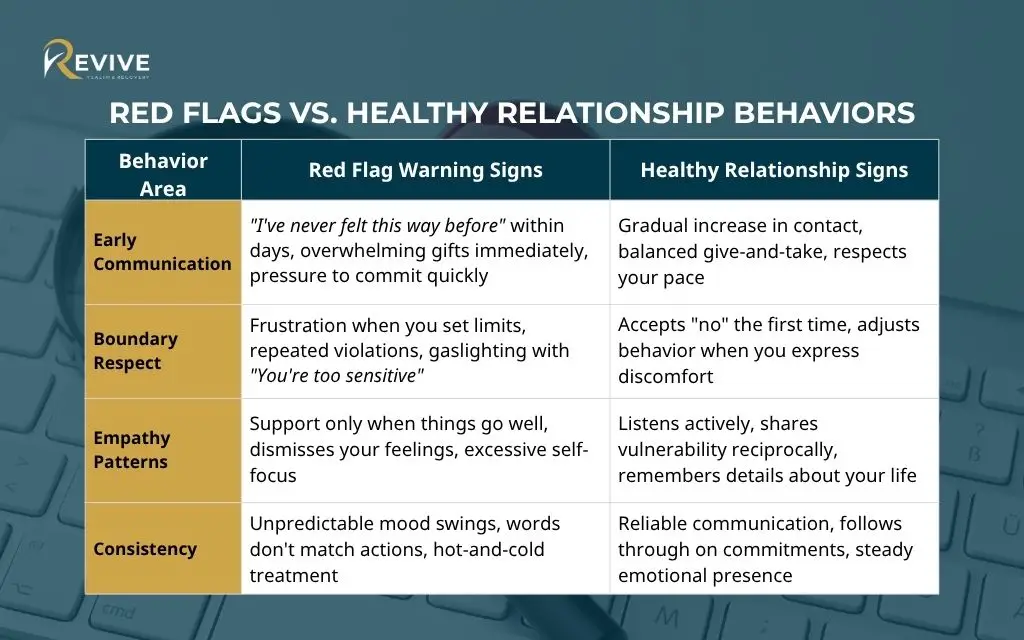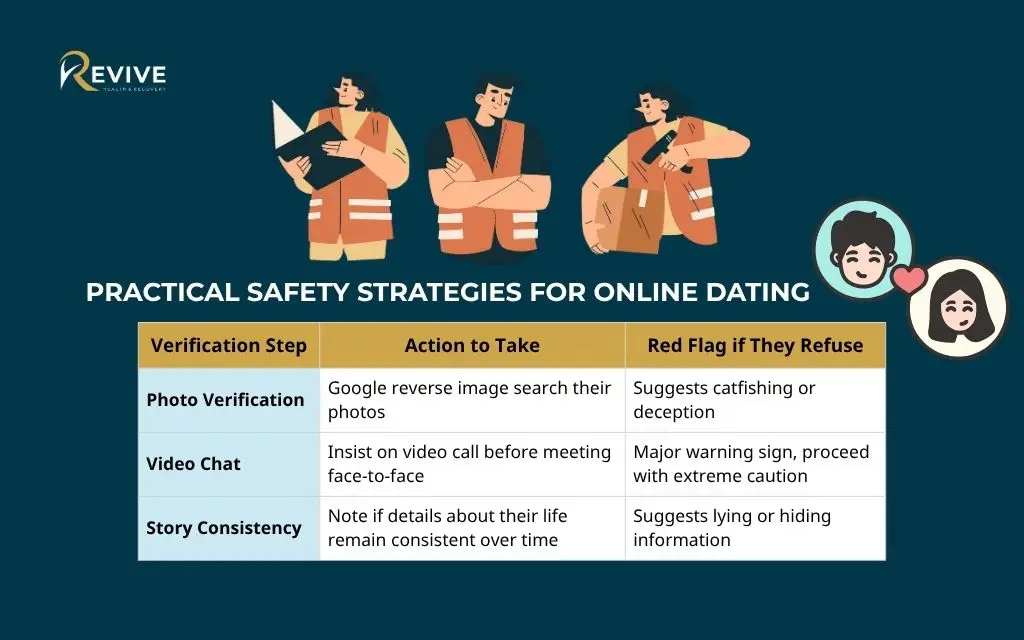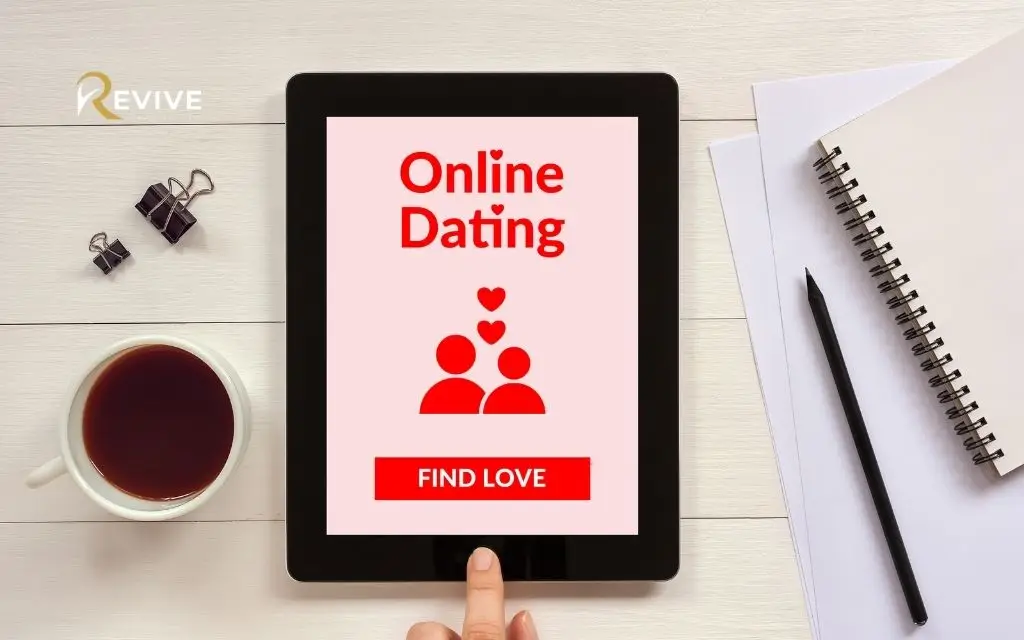Dating apps connect millions of people daily. For trauma survivors, these platforms present unique challenges. Research shows that 46.5% of dating app users experience some form of harm, and those with PTSD face even higher risks.
If you’ve lived through trauma and feel anxious about online dating, your nervous system is working to protect you. That hypervigilance isn’t paranoia. Your body remembers what happened and scans for danger automatically.
This guide addresses trauma and online dating safety with practical strategies. You’ll learn to recognize manipulation, establish boundaries, and date mindfully while honoring your recovery. Revive Health Recovery offers specialized support for trauma survivors navigating relationships.
Ready to discuss your concerns? Call Revive Health Recovery at (720) 263-9986 or visit us at 1427 S Federal Blvd, Denver.
How trauma reshapes your dating experience

Trauma fundamentally changes your brain’s threat detection system. Your nervous system prioritizes survival over connection, creating responses that affect every dating interaction.
When you experience trauma, your brain’s amygdala becomes hyperactive. It stays alert even when actual danger has passed. You might notice your heart racing when reading messages from someone new. Perhaps you freeze when conversation turns intimate. These reactions stem from your autonomic nervous system, which operates below conscious awareness.
Research on attachment theory reveals how early trauma disrupts relationship blueprints. If caregivers couldn’t provide safety, you learned the world is unpredictable.
Understanding your attachment style
| Attachment Style | Dating Behaviors | Impact on Relationships |
| Secure | Communicates needs clearly, trusts gradually, handles conflict constructively | Forms stable, satisfying relationships with balanced closeness and autonomy |
| Anxious | Texts frequently, seeks validation repeatedly, struggles when partner needs space | May push partners away through clinginess or mistake intensity for intimacy |
| Avoidant | Ghosts partners, withdraws when relationships deepen, maintains independence fiercely | Sabotages relationships when they feel too close, struggles with vulnerability |
| Disorganized | Pushes people away while longing for closeness, unpredictable responses to intimacy | Creates chaotic relationship patterns, difficulty trusting own needs or others |
The digital dating paradox affects trauma survivors uniquely. Dating apps combine triggering elements like uncertainty and inconsistent validation. Yet these same platforms offer unprecedented control over exposure and pacing that can support recovery when used mindfully.
Struggling with dating anxiety? Revive Health Recovery’s trauma-informed therapists understand these challenges. Contact us at (720) 263-9986.
The specific risks facing trauma survivors online
Dating app facilitated violence represents a documented pattern. Studies examining thousands of users reveal concerning statistics.
Dating app harm statistics
| Type of Harm | Percentage Affected | Most Vulnerable Groups |
| Any form of harm | 46.5% | Women, users 40+, catfishing victims |
| Pressured into kissing | 32.3% | First-time app users, anxious attachment styles |
| Felt unsafe during meetings | 19.2% | Trauma survivors, those who skip video verification |
| Pressured into sexual acts | 15.2% | Survivors of prior sexual violence |
| Catfished (fake profiles) | 41.9% | All users, higher risk with limited tech literacy |
Predatory individuals actively seek vulnerable targets. They recognize trauma survivors through people-pleasing behaviors, difficulty with boundary-setting, and seeking external validation. These patterns aren’t your fault. They developed as survival strategies.
Despite trauma affecting approximately 50% of the population, no major dating platform currently offers trauma-specific safety features. This gap leaves survivors navigating digital dating without adequate support systems.
Need guidance on safe dating practices? Revive Health Recovery offers practical strategies tailored to trauma survivors. Call (720) 263-9986 today.
Recognizing manipulation tactics and red flags

Love bombing represents the first major warning sign. This tactic involves excessive flattery, rapid intimacy escalation, constant contact, and early declarations of love. Narcissists use love bombing to create emotional dependency before revealing controlling behaviors.
Red flags vs. healthy relationship behaviors
| Behavior Area | Red Flag Warning Signs | Healthy Relationship Signs |
| Early Communication | “I’ve never felt this way before” within days, overwhelming gifts immediately, pressure to commit quickly | Gradual increase in contact, balanced give-and-take, respects your pace |
| Boundary Respect | Frustration when you set limits, repeated violations, gaslighting with “You’re too sensitive” | Accepts “no” the first time, adjusts behavior when you express discomfort |
| Empathy Patterns | Support only when things go well, dismisses your feelings, excessive self-focus | Listens actively, shares vulnerability reciprocally, remembers details about your life |
| Consistency | Unpredictable mood swings, words don’t match actions, hot-and-cold treatment | Reliable communication, follows through on commitments, steady emotional presence |
Pay attention to how someone responds when you share difficulties. Do they listen actively? Or do they minimize your experience and shift focus back to themselves?
Learning to identify these patterns takes practice. Revive Health Recovery’s therapists help trauma survivors develop red flag recognition skills. Contact us at (720) 263-9986.
Building emotional safety through boundaries
Safety must come before intimacy. This principle guides trauma-informed dating. Before disclosure or deep connection, establish baseline safety indicators.
Digital safety boundaries checklist
| Safety Area | How to Protect It | Why It Matters |
| Personal Information | Share gradually after trust is established, use first name only initially | Prevents stalking, harassment, showing up uninvited |
| Photos | Use different photos for dating profiles, avoid landmarks or identifying backgrounds | Prevents reverse image search leading to your accounts |
| Meeting Location | Public places only for first several dates, control your own transportation | Maintains escape routes, ensures witnesses present |
| Identity Verification | Video calls before meeting, Google reverse image search their photos | Reduces catfishing risk, confirms basic honesty |
Emotional boundary guidelines
| Boundary Type | Example Phrases | Expected Response |
| Pacing Disclosure | “I prefer getting to know someone before discussing my past” | Respect without pressing for details |
| Communication Frequency | “I prefer to check messages a few times a day rather than constantly” | Adaptation to your preference |
| Physical Intimacy | “I’m not ready for that yet, but I’ll let you know when I am” | Patience without pressure or guilt |
Healthy boundaries aren’t walls. They’re guidelines that help relationships thrive. Someone who truly cares about you wants to know your limits so they can respect them.
Struggling with boundary-setting? Revive Health Recovery teaches practical skills for asserting needs while maintaining relationships. Call (720) 263-9986.
Practical safety strategies for online dating

Before meeting someone in person, take verification steps. How to date safely after trauma Denver specialists recommend enhanced protocols.
Before the first date safety measures
| Verification Step | Action to Take | Red Flag if They Refuse |
| Photo Verification | Google reverse image search their photos | Suggests catfishing or deception |
| Video Chat | Insist on video call before meeting face-to-face | Major warning sign, proceed with extreme caution |
| Story Consistency | Note if details about their life remain consistent over time | Suggests lying or hiding information |
First date safety protocols
| Safety Element | Specific Actions | Why This Protects You |
| Location | Public, well-populated place during daylight hours | Ensures witnesses, prevents isolation |
| Transportation | Drive yourself or arrange your own ride service | Maintains control over leaving whenever needed |
| Communication | Tell trusted friend where you’re going, who you’re meeting, when you expect to return | Someone knows your whereabouts if something goes wrong |
| Safety Call | Schedule friend to call at specific time during date | Provides legitimate excuse to leave if uncomfortable |
Revive Health Recovery provides comprehensive guidance on how to set boundaries online dating trauma survivors need. Contact us at (720) 263-9986 for personalized support.
Understanding attachment and building trust
Attachment styles trauma impact dating significantly. When trauma occurs in childhood, it disrupts secure attachment formation.
Trauma bonds vs. healthy attachment
| Element | Trauma Bond | Healthy Attachment |
| Formation | Cycles of abuse followed by affection | Consistent safety, trust built gradually over time |
| Power Dynamic | Significant imbalance, one person controls the other | Equal partnership, mutual respect and influence |
| Emotional State | Confusion, self-blame, feeling trapped | Clarity, mutual accountability, freedom to choose |
| Intensity | Feels urgent, consuming, all-or-nothing | Feels stable, secure, allows space for individual growth |
Building trust relationships after trauma Denver therapists emphasize healing attachment wounds through professional support. Cognitive Behavioral Therapy helps reframe beliefs about trust and safety. EMDR processes traumatic memories that interfere with present relationships.
Revive Health Recovery specializes in attachment-focused therapy for trauma survivors. Our Denver location offers both in-person and telehealth options. Call (720) 263-9986.
Denver resources for trauma survivors
Specialized trauma treatment at Revive Health Recovery
Revive Health Recovery, located at 1427 S Federal Blvd in Denver, provides comprehensive services for trauma survivors navigating relationships and dating challenges. Our accredited intensive outpatient facility specializes in PTSD and trauma-integrated therapy using evidence-based treatments.
Our treatment services
| Service Type | What We Offer | Access Options |
| EMDR Therapy | Processing traumatic memories that interfere with relationships | In-person at Denver location |
| Cognitive Behavioral Therapy | Reframing beliefs about trust, safety, and relationships | In-person and telehealth |
| Attachment Therapy | Healing relationship patterns and developing secure attachment | In-person and telehealth |
| Individual Counseling | Personalized treatment addressing your unique needs and goals | In-person and telehealth |
| Co-Occurring Treatment | Integrated care for trauma plus anxiety, depression, or substance use | In-person intensive outpatient |
Convenient and accessible care
We’re located just 100 feet from RTD public transport. We offer both in-person sessions at our Denver location and telehealth options for Colorado residents who prefer remote care or live outside the metro area. We accept Medicaid and work with various insurance providers. Contact us to discuss your coverage and payment options.
Crisis support services
| Resource | Contact Information | Availability |
| Colorado Crisis Services | Call: 1-844-493-TALK (8255), Text: TALK to 38255 | 24/7 free and confidential |
| National Domestic Violence Hotline | Call: 1-800-799-SAFE (7233) | 24/7 free and confidential |
| RAINN National Sexual Assault Hotline | Call: 1-800-656-HOPE (4673) | 24/7 free and confidential |
Don’t navigate trauma and online dating safety alone. Revive Health Recovery’s specialized team understands your challenges. Call (720) 263-9986 today.
FAQs about trauma and online dating safety
Should I mention my trauma in my dating profile?
No. Most trauma specialists advise against disclosing trauma in dating profiles. This information can make you vulnerable to predators who actively seek targets. Share selectively once trust is established through consistent behavior over time. Focus your profile on interests, values, and what you seek in healthy relationships. Revive Health Recovery helps you determine appropriate disclosure timing.
How do I distinguish intuition from trauma response?
Intuition tends to feel calm, clear, and specific. For example, “Something feels off about how he dismisses my questions.” Trauma responses are often intense, vague, and tied to past experiences, like “Everyone will hurt me.” Grounding techniques, therapy, and tracking patterns help distinguish between them. When uncertain, proceed slowly. Genuine partners respect your pace. Revive Health Recovery therapists teach discernment skills. Call (720) 263-9986 for guidance.
Can I date while still in trauma therapy?
Yes, though timing depends on your individual healing journey. Some people benefit from dating during therapy, using real experiences to process in sessions. Others need focused healing time first. Key readiness indicators include ability to set boundaries, recognize red flags, manage triggers, and maintain sense of self in relationships. Discuss your situation with your Revive Health Recovery therapist at (720) 263-9986.
What should I do if I’m triggered during a date?
Have a plan prepared. Excuse yourself to the restroom and use grounding techniques like naming five things you see. Call your support person. End the date early if needed. Leaving when unsafe or overwhelmed represents self-protection, not failure. A safe partner understands if you explain you need to pause. Someone who pressures you reveals they’re unsafe. Revive Health Recovery teaches trigger management strategies. Contact us at (720) 263-9986.
How long should I wait before physical intimacy after trauma?
No universal timeline exists. Only you know what feels right for your healing. Benefits include clear communication about boundaries before physical situations, partners who respect pacing without pressure, and ability to pause or stop anytime. Process with a therapist if intimacy triggers flashbacks or dissociation. Genuine partners prioritize your comfort over their desire. Revive Health Recovery provides support for intimacy concerns at (720) 263-9986.
Take the next step toward healing
Trauma and online dating safety requires balancing self-protection with openness to connection. Understanding how trauma shapes your nervous system responses, recognizing manipulation tactics like love bombing and boundary violations, and implementing evidence-based safety strategies empowers you to date mindfully while honoring your recovery.
Your hypervigilance protects you. Your need for safety is valid. Your worthiness of healthy, respectful love isn’t contingent on how “healed” you are. Recovery happens at your own pace.
Revive Health Recovery understands the complexities of dating after trauma. Our trauma-informed therapists provide personalized, compassionate care in Denver and throughout Colorado via telehealth. We specialize in PTSD treatment, attachment healing, relationship trauma recovery, and helping survivors build trust capacity.



